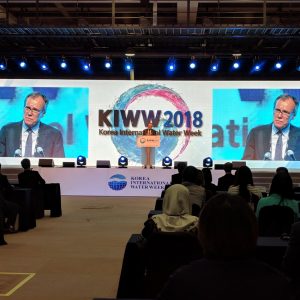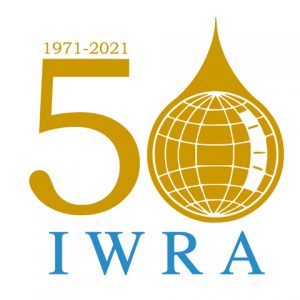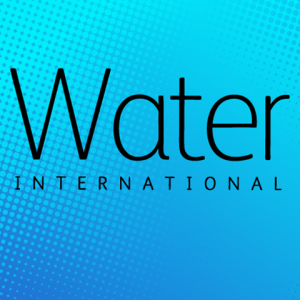
Callum Clench, IWRA Executive Director
2018 has got off to a busy start for IWRA. I write this editorial from the 8th World Water Forum being held in Brasília, the theme of which is “Sharing Water”. It is always great to see so many people, including IWRA Members, come together to support and learn more about the cause of water. Brasília is the first time that the Forum has ever been held in the Southern Hemisphere. Brazil is a country with complex water issues, which feeds well into the discussions being held here not only in the formal sessions, but in the corridors and meeting rooms across the venue and city.
IWRA is well represented at the Forum this year with our involvement in the Thematic Process, particularly through our role as Topic Lead for “Ensuring water quality from ridge to reef” under the theme of “Ecosystems – Water quality, ecosystem livelihoods and biodiversity”. This continues the role we had at the 7th World Water Forum held in Korea, and the Implementation Roadmap and Action Monitoring System that IWRA continued to support. In addition we have been part of the thematic coordination group for the cross-cutting theme of “Capacity – Education, capacity building and technology exchange”, and the topic coordination group for “Climate science and water management: the communication between science and decision/policy making” under the theme of “Climate – Water security and climate change”. This work fits well with IWRA’s core remit to improve and expand the understanding of water issues through education, research and information exchange among countries and across disciplines. And of course it continues the excellent work from our own XVI World Water Congress where the theme was ““Bridging Science and Policy”, resulting in the “Cancun Declaration – A Call for Action to Bridge Science and Water Policy-Making for Sustainable Development”.
In addition, March 22 was World Water Day, focusing on the theme “The Answer is Nature”. The theme poses the question “How can we reduce floods, droughts and water pollution?” and proposes the solution is “By using the solutions we already find in nature.” UN Water points out that today, 2.1 billion people live without safe drinking water at home; affecting their health, education and livelihoods. Damaged ecosystems affect the quantity and quality of water available for human consumption. However, ecosystem services for water are often poorly understood, as we lack robust data and a clear understanding of the indirect as well as direct benefits that they offer. “Green infrastructure” needs to be better understood and supported, to reinforce the “grey infrastructure” that is so often struggling to cope. More information can be found on UN Water’s World Water Day factsheet. This topic is timely and important, so IWRA hosted a webinar on World Water Day on this topic, which you can find on our website.
In addition to all the preparations for Brasilia and World Water Day, I was invited by the Portuguese Water Resources Association (APRH) to give a keynote speech at the 14th Portuguese Water Congress held in Évora. It was an honour to be invited to speak and to offer an international perspective on water resource management in a time of change and increasing new challenges.
Finally, as IWRA makes its own efforts to continue to adapt and keep up with the latest trends, we hope that you appreciate the new format of our quarterly newsletter. Further changes to our website, particularly the membership space, are planned for the coming months. Keep an eye out for this.
I hope that 2018 is a productive year for you all.



